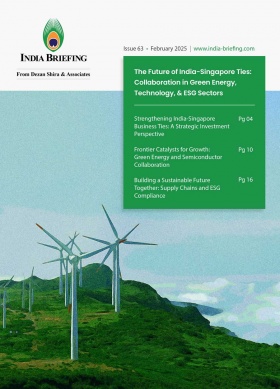MCA Proposes Expansion of Fast-Track Merger Rules in India
To streamline corporate restructuring and ease doing business, India’s Ministry of Corporate Affairs (MCA) has proposed expanding fast-track mergers under Section 233 of the Companies Act, 2013. The draft, issued on April 5, 2025, extends simplified merger procedures to more unlisted and low-debt companies.
Draft amendments to the Companies (CAA) Rules, 2016, are now open for public consultation on the MCA website.
In a bid to enhance the ease of doing business and streamline corporate restructuring processes, India’s Ministry of Corporate Affairs (MCA) has proposed amendments to expand the scope of fast-track mergers. A draft notification, issued on April 5, 2025, seeks to amend the Companies (Compromises, Arrangements, and Amalgamations) Rules, 2016.
This move aligns with the broader reforms outlined in India’s Union Budget for FY 2025–26, which emphasized simplifying merger procedures and broadening their applicability. The proposed changes target Section 233 of the Companies Act, 2013—a provision that facilitates quicker, less burdensome mergers for eligible companies.
Expansion of fast-track merger rules under Section 233 of the Companies Act, 2013
In line with India’s ongoing efforts to enhance the ease of doing business and simplify corporate restructuring, the central government has proposed notable amendments to Rule 25 of the Companies (CCA) Rules, 2016, which governs fast-track mergers under Section 233 of the Companies Act, 2013.
The current framework allows fast-track mergers between small companies and between a holding company and its wholly-owned subsidiary in the country. In February 2021, India introduced sub-rule (1A) within Rule 25, enabling mergers between start-up companies and between start-ups and small companies.
Building on this, the draft amendment notified in 2025 aims to broaden the eligibility framework for fast-track mergers. Key changes include the following:
- Inclusion of certain unlisted companies: The proposed amendment would permit mergers between unlisted companies, other than Section 8 companies, provided they meet the following conditions:
- Their total borrowings from banks, financial institutions, or other corporate bodies do not exceed INR 500 million (US$5.79 million);
- Companies with no record of default in repayment of such borrowings; and
- An auditor’s certificate confirming compliance with these criteria must accompany the merger application.
- Expansion to non-wholly-owned subsidiaries: The current scope is limited to wholly-owned subsidiaries in the Companies (CCA) Rules, 2016. The proposed amendment allows mergers between a holding company (whether listed or unlisted) and its unlisted subsidiaries, even if they are not wholly-owned, provided the subsidiary is not a listed entity.
- Inclusion of mergers between fellow subsidiaries: The amendment also proposes allowing mergers between unlisted fellow subsidiaries—companies that share the same parent entity— under Section 233. The amendment is expected to facilitate group-level restructuring with reduced regulatory hurdles.
- Consolidation of cross-border merger provisions: The draft also incorporates into Rule 25 the provision currently contained in Rule 25A(5), which allows mergers between a foreign holding company incorporated outside India and its wholly-owned Indian subsidiary. This move is intended to make Rule 25 a self-contained, comprehensive provision governing fast-track mergers, both domestic and cross-border.
India’s central government invites public consultation
MCA has released draft amendments to the Companies (CAA) Rules, 2016, for public consultation. To access the draft notification and submit your comments, follow these steps:
- Visit the Ministry of Corporate Affairs, Government of India, website.
- On the homepage, click on the “E-Consultation” tab in the main menu.
- Scroll down to the section titled “List of documents open for consultation.”
- Click on “Comments due soon: Beyond 7 days” to access the relevant consultation documents.
- From the listing page, you can view the draft notification and download the instructions kit for submitting your comments.
Stakeholders are encouraged to review the proposed changes and submit their comments or suggestions by May 5, 2025. Following the conclusion of the consultation period, the finalized rules are expected to be officially notified and brought into effect.
India’s push for corporate efficiency
Earlier in February 2025, the central government stated its intention to “rationalize requirements and procedures for speedy approval of company mergers.” The objective is to simplify regulatory formalities and allow more companies—especially startups and micro, small, and medium enterprises (MSMEs)—to benefit from faster consolidation pathways.
Experts have welcomed the proposal, highlighting its potential to reduce compliance burdens, promote group-level restructuring, and help companies respond more effectively to post-pandemic market shifts.
Company law experts in the country have noted that by bringing in unlisted and low-debt companies, the government is addressing longstanding demands from industry stakeholders. The reform is expected to benefit businesses seeking consolidation without the lengthy timelines and procedural rigor of traditional mergers under tribunal supervision.
Also read: M&A Due Diligence in India: Assessing Target Company Non-Compliance
Understanding Section 233 of the Companies Act, 2013
Section 233 offers simplified mergers and amalgamations for eligible companies, bypassing the more elaborate approval route through the National Company Law Tribunal (NCLT). Instead, regulatory clearances are managed by the central government via regional directors.
The provision currently applies to mergers between two or more small companies or between a holding company and its wholly-owned subsidiary. However, the proposed amendments aim to significantly expand this list.
Fast track M&A mechanism in India
The fast-track process under Section 233 includes the following steps:
- Companies involved in the merger must issue a notice of the proposed scheme, inviting objections or suggestions from the Registrar of Companies, the Official Liquidator, and any affected parties within a 30-day window;
- The scheme must be approved by 90 percent of shareholders and by creditors representing at least 90 percent in value. This can be achieved through a formal meeting or written consent.
- Each company must file a declaration of solvency with the Registrar, certifying their ability to meet financial obligations; and
- Upon receiving approvals, the transferee company submits the scheme to the central government. If there are no objections from regulatory bodies, the scheme is registered and confirmed.
Legal implications of fast-track mergers
Upon approval, a fast-track merger results in the automatic dissolution of the transferor company without requiring a separate winding-up procedure. All of its assets, liabilities, and ongoing legal matters are seamlessly transferred to the transferee company. Additionally, any shares that the transferee company previously held in the transferor are cancelled, and the transferee’s authorized share capital is updated to incorporate the merged entity.
Conclusion
The expansion of fast-track merger provisions under Section 233 represents a major step toward making India’s corporate restructuring landscape more agile and accessible. By allowing a broader range of companies to benefit from simplified merger procedures, the reform is expected to reduce red tape, lower compliance costs, and improve operational flexibility.
(US$1 = INR 86.23)
About Us
India Briefing is one of five regional publications under the Asia Briefing brand. It is supported by Dezan Shira & Associates, a pan-Asia, multi-disciplinary professional services firm that assists foreign investors throughout Asia, including through offices in Delhi, Mumbai, and Bengaluru in India. Readers may write to india@dezshira.com for support on doing business in India. For a complimentary subscription to India Briefing’s content products, please click here.
Dezan Shira & Associates also maintains offices or has alliance partners assisting foreign investors in China, Hong Kong SAR, Dubai (UAE), Indonesia, Singapore, Vietnam, Philippines, Malaysia, Thailand, Bangladesh, Italy, Germany, the United States, and Australia.
- Previous Article Apple, Foxconn Boost iPhone Output in India as US Tariffs Reshape Supply Chains
- Next Article SEBI Amends ICDR Regulations for Capital Raising and Disclosure Norms








